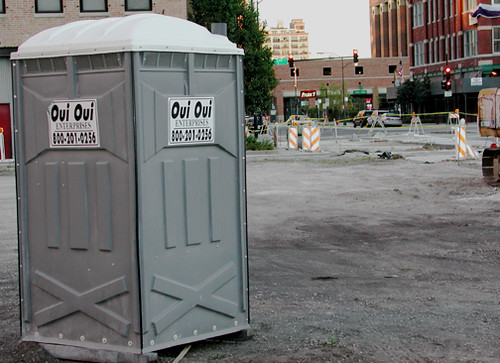
Interesting investigative journalism by the Chicago Tribune. Here is Chicago described in less than flattering terms. The so-called City that Works is greased by totally legal (mostly) campaign contributions from developers.
DEVELOPERS Many give to aldermanic campaigns in quest to build bigger, pricier projects. ALDERMEN They decide who can build what. Money, not planning, often drives process. HOMEOWNERS They are often left out of the decision-making and boxed in by towering structures.
[snip] Zoning rules had prohibited such a behemoth from going up on the block. But that was before the developer got a break from then-Ald. Ted Matlak (32nd). Two weeks after the developer applied for a lucrative "upzoning" so he could build a much bigger house, one of the developer's companies gave the alderman a $2,000 campaign contribution.
The real zoning code in Chicago is unwritten, but developers know it well: Changes in zoning go hand in hand with contributions to aldermanic campaigns.
In an unprecedented investigation of city development, the Tribune examined 5,700 zoning changes approved by the City Council over the last decade and recorded on sheets of paper clipped into binders in a City Hall office. The newspaper converted the paper records into an electronic database to perform an analysis of development beyond the scope of anything previously possible, even for city planners.
The investigation found that Chicago is a city where a building boom greased by millions of dollars in political donations to aldermen has remade the face of neighborhoods, changing the feel of the streets where people live and work.
It's a city where aldermen have become dependent on the political contributions they rake in from developers, while routinely ignoring city planners who oppose out-of-scale development.
It's a city where the council rubber stamps aldermen's wishes -- rejecting just 15 requested zoning changes in a decade -- and where almost half the zoning changes were concentrated in 10 of the city's 50 wards that are exploding with growth.
And it's a city where advisory groups that review zoning proposals are sometimes stacked with developers and real estate agents who will profit from the projects. [Click to read more of: How cash, clout transform Chicago neighborhoods]
Obvious to anyone who pays attention to what buildings get approved, and where. Pay enough to an Alderman, and his answer is always, "Oui! Oui!"

This practice of "aldermanic prerogative" creates a political spoils system where cash and clout trump the public planning process employed in many other major American cities. The result is a patchwork approach to development, where the fate of any zoning change is decided long before it is ever discussed publicly by the council's Zoning Committee.Not quite as bad as Houston, TX, but approaching so. What would be a solution? How about having an actual vetting process with actual community residents having meaningful contribution. Instead, if the Alderman gives the green light, there are very few impediments to the construction being completed.
The decisions made in ward offices and rubber stamped in City Hall are driving the transformation of Chicago, making neighborhoods unrecognizable to people who have tended their homes and yards there for decades.
